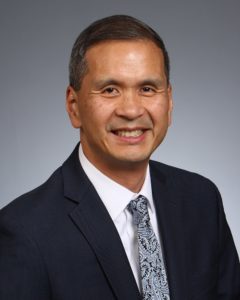Nolan Chang, MD, shares ways Kaiser Permanente is using AI to better the patient experience and reduce physician burnout.
Leong Koh, MD, speaks on the importance of recruiting and retaining primary care physicians

During the opening keynote panel of the recent Becker’s Hospital Review 13th Annual Meeting in Chicago, Leong Koh, MD, president and CEO of Northwest Permanente, emphasized the importance of recruiting and retaining primary care physicians, particularly as the nation recovers from the COVID-19 pandemic.
“We have aggressive recruitment and retainment targets,” Dr. Koh said. “The reason those targets are a growth strategy is because … folks are looking to do digital and in-person care, so we’ve got to figure out a way to support our primary care workforce.”
The United States faces a shortage of 50,000 primary care physicians in the next 15 years — a shortage that is expected to grow as the population ages. Dr. Koh noted that primary care physicians play a pivotal role in coordinating care for an integrated, value-based, multispecialty health system such as Kaiser Permanente.
Related story: “T. Ruth Chang, MD, speaks on how the industry can address the projected physician shortage”
Another strategy for retaining and attracting primary care physicians is to offer more choices in the way their clinical work is managed. For example, Northwest Permanente offers physicians with the most complex patient panels the option of longer appointment times, or, if they didn’t want a complex panel, to have virtual scribes.
Dr. Koh also pays in-person visits to clinical teams in the organization’s various medical buildings. “To keep people engaged and the business growing we are getting out there … and doing as much rounding as possible,” Dr. Koh said. “That is taking care of people and really helping us to get ideas from the front line.”
During a recent rounding visit to a medical office building, a clinician suggested adapting an underutilized ultrasound machine for additional use. “One of the docs … said, ‘I’d like to consider doing ultrasound-guided joint injections using that machine and all you need is a different probe.’ And we said okay. He’s since gotten a bunch of referrals from primary care doctors for joint injections.”
Dr. Koh added that rounding needs to be intentional to be effective. “Everyone on my executive team has rounding as a common goal,” he said. “We actually measure it, and it’s tied to incentives.”
Related story: “PermanenteDocs Chat on the physician workforce”
Every member of Northwest Permanente’s executive team shares a common goal. According to Dr. Koh, “Our north star is about our patients, it’s our purpose. It’s either an access or experience score. It doesn’t matter whether you’re in the legal office, or a compliance department or in HR. They all have access goals. It’s about aligning folks to a common goal — making sure that our people are taken care of. This is our journey for the next 12 to 24 months.”
Note: For a summary of this panel, “The Growth Strategies and Culture of Top-Performing Health Systems,” and other meeting highlights, visit Becker’s Hospital Review.
You can also listen to Dr. Koh discuss his career journey, Northwest Permanente’s hospital-level care at home program, pride in the people at his organization, and what health care leaders need to be successful on a related Becker’s Healthcare Podcast.


